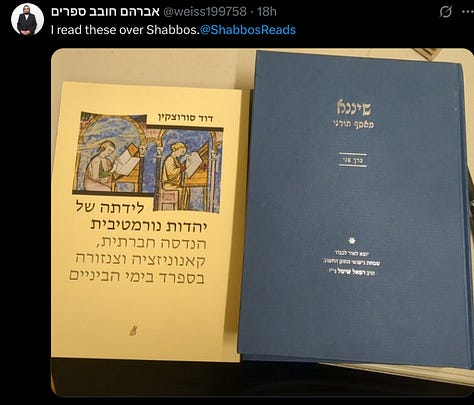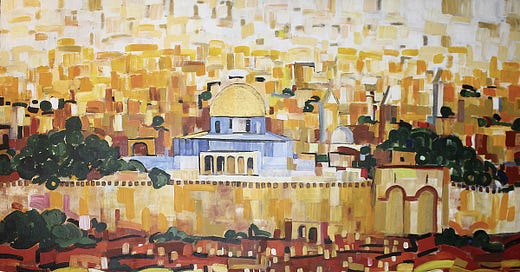We Need More Jewish Fiction
On humanity, relationships, and the diversity of Jerusalem in Rebecca Wolf’s Alive and Beating
My love of reading has always been found in fiction. As I’ve discussed previously, fiction opened up the world of reading for me and I’m still drawn to it more strongly than I am to nonfiction.
But here’s my question: Why don’t we have more Jewish fiction? This is not at all to discredit the incredible works of iconic writers of the previous century, such as Potok and Bellow and Roth. But we don’t do enough to highlight contemporary Jewish fiction writers.
Rebecca Wolf’s novel, Alive and Beating, is a fresh new work of Jewish fiction that is thought-provoking and heartening. The book follows six characters of diverse backgrounds and neighborhoods in Jerusalem, all of whom are in desperate need of organ transplants, until a terrorist bus bombing enables them to receive organs from victims of the attack.
The idea for the novel was inspired by the true story of Alisa Flatow, Wolf’s close friend from high school who was murdered in a terrorist attack in 1995. Alisa had taken a semester off from college to study at Nishmat in Jerusalem. When a terrorist drove his truck into a bus she was on, leaving her nearly unharmed but severing her brain stem, her family decided to donate her organs. Now, 30 years later, Wolf has published this novel in tribute to her childhood friend.
Wolf paints a colorful, vivid portrait of Jerusalem’s diversity in her chapters. Each chapter tells a different story, and Wolf does a phenomenal job detailing the lives of the characters and the way that illness has upended their lives.
Leah Weiss, a young Charedi woman in need of a kidney transplant, finds compassion in the nurse at her hospital, while her busy and overbearing mother bemoans the fact that Leah is not yet married. Hoda Ibrahim is a renowned hair stylist in East Jerusalem, but in her private life she suffers from a debilitating kidney disease and worries about her teenage son’s suspicious activity. Father Severen, a monk who lives in the Christian Quarter of the Old City, longs to adopt a baby from the NICU he volunteers for, but awaits a pancreas transplant due to hypoglycemic unawareness.
These are just some of the characters whose stories we follow, ultimately with each of them ending up in the same hospital to receive their organ transplants.
Each chapter ends in a cliffhanger, and we never actually find out what happens once the recipients are told there is an organ available. This was intentional—Wolf wanted to demonstrate the tremendous lack of clarity in organ donation stories. “Probably the main reason I left it ambiguous was because unfortunately, you could literally be almost there and then it doesn’t work out,” Wolf told me. The whole novel takes place over 36 hours to illustrate the pressure of time when organ donations are forthcoming.
The final chapter tells the story of Yosef and Youssef, two teenage boys who share a room in the hospital, where they await heart transplants for their advanced cardiac diseases. Initially, the boys don’t get along—not because one is an Arab and one is a Jew, but simply because they want to be at home and healthy. The boys quickly become best friends and the story ends with one of them receiving the transplant, but we do not find out which boy. “It was very important to me that it didn’t matter which boy got it,” Wolf told me.
Ultimately, all the characters end up in the same hospital as they await their organ donations. The hospital functions as the vehicle in the story through which we learn the concept of shared humanity. “Organs work for anyone,” Wolf explained to me, “No matter who you are on the outside.” As one hospital worker tells Yosef and Youssef:
“I guess that’s why people get along in the hospital. Because you realize we’re all the same inside.”
I noticed other themes that wove in and out of every story, further emphasizing the idea that some experiences are universal no matter where you come from. Each story contains complex parent-child relationships, pressures to marry, and unwavering (though sometimes also shaky) faith. On the shared theme of different models of relationships, whether between parents and children or between partners, Wolf explained, “We’re wired to want to take care of our children and to love each other … Using that as a theme was another way to unite all of us.”
Wolf hopes that the takeaway message of the story is to hold on. “If we can’t see the humanity in our enemies, there’s no hope for the world,” Wolf said. While she worked on the novel for quite some time, she believes ultimately the timing of its publishing could not have been better. At a time when we are strongly divided on many fronts, the novel serves as a reminder to strive to see humanity in others.
“I hope somebody will read the book and say, ‘Wow, we should try harder,’” Wolf said. “Because isn’t that the saddest part? That it’s 30 years later [since Alisa’s death] and maybe there aren’t as many suicide bombings, but at the end of the day, it’s not better. It’s probably worse.”
Wolf’s novel is creative and heartwarming. It is the type of book that you can read in one sitting and finish feeling inspired. And it’s a work of Jewish fiction that does an excellent job highlighting diversity and our shared humanity—both within the Jewish community and in the neighborhoods that we share with others.
What Jewish fiction books would you suggest? Any classic or contemporary favorites?
What did you read over Shabbos?
A selection of shared Shabbos reads

















Great post, thanks Rivka. I hadn't heard of Rebecca Wolf's book previously...looking forward to checking it out. As Erika mentioned, I host a monthly author series featuring three authors of new books with Jewish content (mostly fiction, and some poetry and memoir)...It's over Zoom and occasionally in-person in Modiin... Here is the list of authors we have featured... https://bookshop.org/lists/books-by-authors-hosted-by-literary-modiin
The next Literary Modiin event is coming up right after Yom Hashoah - April 27 - due to the nature of this one, it is two memoirs and one novel...would love to see some new faces there!
https://www.juliezuckerman.com/event-info/literary-modiin-april-2025-author-event
I couldn't agree more!! Thanks for this post and for sharing about this book, which sounds amazing. This is exactly why I committed my author brand to writing strong Jewish characters into every book I write. My third novel releases in June, and they all have a thread of Jewish identity through them. It's so important!!